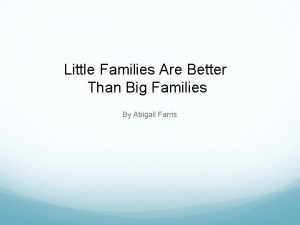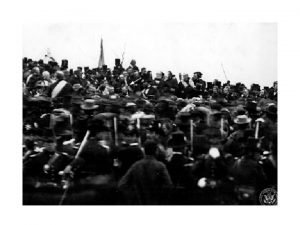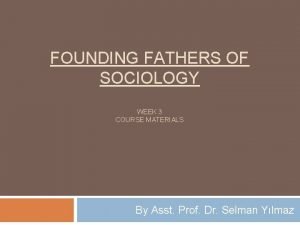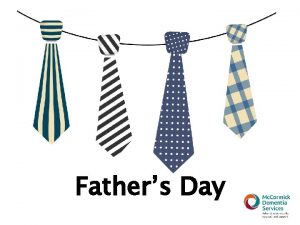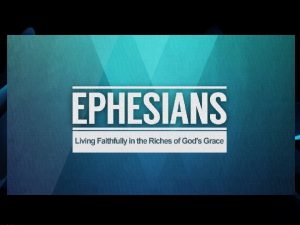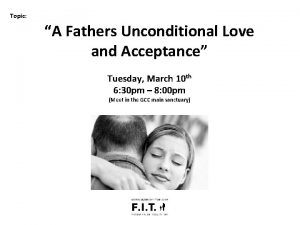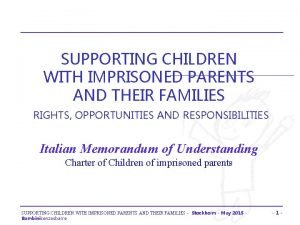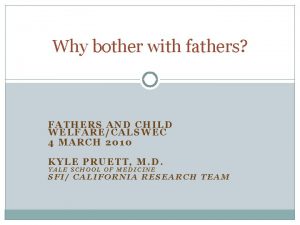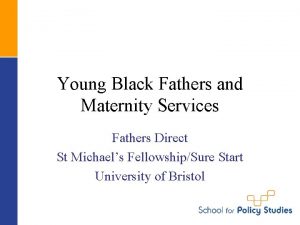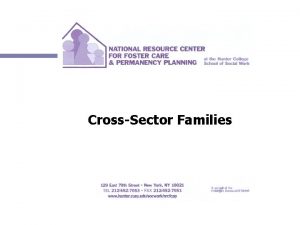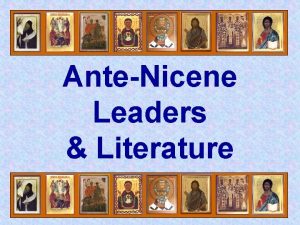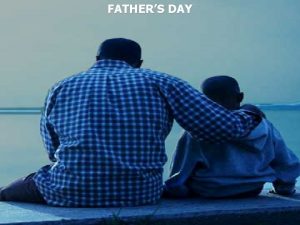Imprisoned Fathers Families and the Intergenerational Effects of














- Slides: 14

Imprisoned Fathers, Families and the Intergenerational Effects of Crime – Effect of the Families Matter Programme. Dr Michelle Butler 22 nd September 2015 Queen’s University Belfast

Parental Imprisonment Children Partners/Caregivers Separation Anxiety Loss of income Anger Extra childcare burdens Worry about safety and well-being of imprisoned parent Feelings of social isolation Behavioural disturbances Difficulty maintaining contact Deterioration in school performance Relationships breakdown Stigma Decrease in stable, quality parenting due to additional commitments by remaining parent/caregiver must take on Added financial strain due to costs associated with imprisonment (e. g. visiting, telephone contact, sending money into prison, etc. ) Teasing Divorce Bullying Moving home Increased probability of being involved in crime/antisocial behaviour Psychological stress as they attempt to support themselves, imprisoned individual and children Increased probability of being imprisoned Poor visiting conditions Home instability, homelessness, foster care placements. Perceived hostile attitudes of some prison staff towards families Poor health outcomes, add to the cycle of political, social and economic exclusion. Problems reuniting with partner on release from prison © Barnardo’s

Parental Imprisonment 3 x more at risk of criminal behaviour, mental health problems and other adverse outcomes. BUT relationship appears stronger for male children and varies between jurisdictions. Effects more noticeable in jurisdictions with mass imprisonment and evidence of racial disparities. 25 -30% global increase in the number of people imprisoned since the late 1990 s and 78% of countries increased imprisonment. Need to minimise the effects to protect children’s well-being, reduce social inequality and prevent the intergenerational transmission of criminal behaviour.

Families Matter Programme Jointly developed and delivered by Barnardo’s NI and NI prison service. Focused on improving the lives of children by developing and maintaining links with imprisoned parents. Programme aims to: Reduce the negative effects of parental imprisonment on families Provide opportunities to develop/maintain ties Enhance capacity to parent to contribute positively to family life while in custody and on release Give fathers an opportunity to reflect on their relationships with their families and how their choices affect their families.

Research Project sought to examine: Examine the rationale, design and implementation of the Families Matter programme. Assess if programme participation reduced the negative effects of imprisonment for children, partners/caregivers and fathers. Examine if the programme can help improve relationships between fathers and their families during imprisonment. Mixed methods approach consisting of observations and interviews. Forty-two interviews were conducted with fathers, family members and professionals and one programme cohort was observed in an attempt to outline how programme components linked to observed and reported changes in fathers, families and the prison environment. Interview findings were triangulated with observation findings.

Research Findings Programme design, rationale and implementation DID matter. Similar to the ‘what works’ literature, it appeared to influence engagement with and potential benefits of programme participation. Programme participation DID reduce the negative effects of imprisonment for children, fathers and partners/caregivers, at least in the short term. Families Matter programme DID improve relationships between fathers and their families during imprisonment BUT unclear to what extent this was maintained beyond the programme.

Programme Design & Delivery

Reduced Effects Parental Imprisonment Children Happier, less worried about fathers and better able to cope. Improved communication with fathers and parents addressing acting out behaviour together. Fathers more attuned to needs and how children were dealing with the loss of their father. Fathers better equipped to meet needs and more opportunities to talk, interact and play with children. Family visits allowed more ‘normal’ family interaction, helping reestablish relationships with children and key for bonding with babies. Parents/Caregivers Less worried about safety of fathers. Reduced relationship strain through improvement communication and engagement. Greater appreciation by fathers for what they were going through. Reduced feelings of stigma and isolation. Independent verification that fathers were engaging with programme. Built/re-built trust in father’s parenting abilities.

Reduced Effects Parental Imprisonment Fathers Relationships did not break down. Increased confidence in parenting skills, noticing signs of distress and addressing sensitive topics with children. Improved understanding of child development and insights into child behaviour Learning from the experiences of other fathers Less macho, aggressive culture with less exposure to drugs. Culture of peer support and talking about families. Humanised staff-father interactions and staff-family interactions Increased well-being and ability to cope

Father and Family Relationships “Yes, we are a lot more happy. A lot more positive. […] From doing the Families Matter programme it has let us see the importance of being a family unit […] It has made us want to be together more and share those memories that we have made inside […] [Without the programme] maybe we wouldn’t be together. Wouldn’t be as close. Because them one hour [normal] visits are horrendous. […] Yeah, we could have drifted. […] I mightn’t have went up every week. The family visit like nearly made you go up. ” “It has just built that bond back, because he was losing it with [name of child]. He was losing that bond with [name of child] at the beginning whenever he went inside, because it was like [name of child] thought [name of father] had just left him. So then he was not wanting to see [name of father] or speak to [name of father], he hated [name of father] and resented him. So […] with the [family] visits they regained it again. ”

Father and Family Relationships HOWEVER need to better plan for and manage progression from the programme and links with existing rehabilitation and desistance strategies. “You wouldn’t really need to go back into those unfriendly visit rooms [normal visits] again, and the thing is, you have a child where at the end of the day you can run over and grab her, or grab him, throw them about, get them onto the mats, play, do the things that mothers and fathers should be doing. […] And then the next thing is […] Daddy can’t move. What? Daddy’s not allowed off this pink chair. […] You are given all this freedom on one hand, and you are giving the child, you are expanding their little minds, and then the next thing is, the child doesn’t see the bigger picture, as in the system; they see that their daddy doesn’t care about them anymore. Their daddy doesn’t want them as much as they thought. So you can actually give a child a complex. […] So there is a lot of work to be done here. A lot of work. ”

So…… Great potential to reduce the negative effects of parental imprisonment, help minimise family breakdown, improve children’s well-being and keep fathers involved in parenting while imprisoned. Attempts to diminish the intergenerational transmission of crime by reducing the effects of parental imprisonment and encouraging fathers to continue to parent from prison. YET, while promising, the long-term effects and potential to reduce the intergenerational transmission of crime remain unknown.

Thank you!

References Andersen, S. H. , & Wildeman, C. (2014). The effect of paternal incarceration on children's risk of foster care placement. Social Forces, 93(1), 269 -298. Besemer, S. , van der Geest, V. , Murray, J. , Bijleveld, C. C. J. H. , & Farrington, D. P. (2011). The relationship between parental imprisonment and offspring offending in England the Netherlands. Murray, J. , & Farrington, D. (2005). Parental imprisonment: Effects on boys' antisocial behaviour and delinquency through the life-course. Journal of Child Psychology and Psychiatry, 46(12), 1269 -1278. Murray, J. , & Farrington, D. P. (2008). The effects of parental imprisonment on children. Crime and Justice: A Review of Research, Vol 37, 133 -206. Murray, J. , Farrington, D. P. , & Sekol, I. (2012). Children's antisocial behavior, mental health, drug use, and educational performance after parental incarceration: A systematic review and meta-analysis. Psychological Bulletin, 138(2), 175 -210. Murray, J. , Janson, C. , & Farrington, D. P. (2007). Crime in adult offspring of prisoners - A cross-national comparison of two longitudinal samples. Criminal Justice and Behavior, 34(1), 133 -149. Piquero N. L. , Gover A. R. , Mac. Donald J. M. , & Piquero A. R. (2005) ‘The influence of delinquent peers on delinquency: Does gender matter? ‘, Youth and Society, 36, 251– 275. Walmsley, R. (2013). World prison population list (tenth edition). (). London: International Centre for Prison Studies. Walters, G. D. (2015 a) ‘Someone to look up to: Effect of role models on delinquent peer selection and influence’, Youth Violence and Juvenile Justice, Available at http: //yvj. sagepub. com/content/early/2015/02/03/1541204015569317. full. pdf (Accessed 11 th September 2015). Walters, G. D. (2015 b) ‘The Parent-Peer Interface: Does inductive parenting reduce the criminogenic effects of delinquent peers? ’, Youth Violence & Youth Justice, Available at http: //yvj. sagepub. com/content/early/2015/04/13/1541204015581058. refs (Accessed: 11 th September 2015) Warr, M. (1993) ‘Parents, peers and delinquency’, Social Forces, 72, 247– 264. Wildeman, C. (2014). Parental incarceration, child homelessness, and the invisible consequences of mass imprisonment. Annals of the American Academy of Political and Social Science, 651(1), 74 -96. Wildeman, C. , & Andersen, L. H. (2015). Cumulative risks of paternal and maternal incarceration in Denmark and the United States. Demographic Research, 32, 1567 -1580.
 Intergenerational conflict in the workplace
Intergenerational conflict in the workplace Imprisoned sight
Imprisoned sight Little families
Little families Four scores and seven years ago
Four scores and seven years ago How long is four score and seven years ago
How long is four score and seven years ago Church fathers trinity
Church fathers trinity Trinity biblical definition
Trinity biblical definition Founding fathers of sociology
Founding fathers of sociology Harlon block
Harlon block Story of fathers day
Story of fathers day Fathers day in italy
Fathers day in italy Do not provoke your child to anger
Do not provoke your child to anger Limbo of the fathers
Limbo of the fathers Father's love letter
Father's love letter Unconditional
Unconditional


